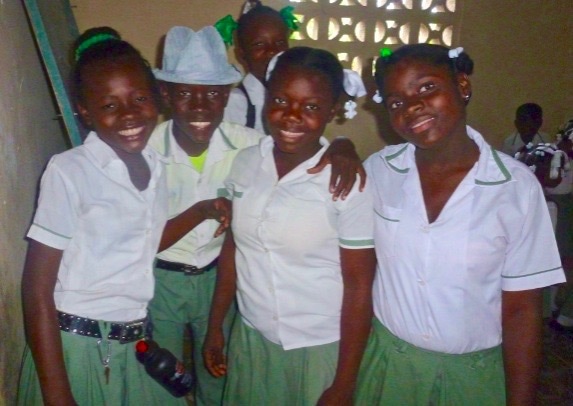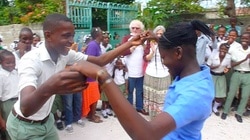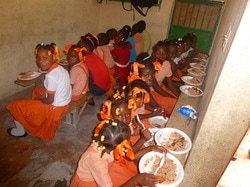
LUNCH PROVIDED FOR FULL DAY CLASSES! Due to the 2 months of no school last year #13, our schools decided to double classes each day. We had a special donation button on our St. Columba page and raised enough money for 2 months. $1,800 per month, $800 for utensils. Thank you! Now, Year #14, 2023-24, we have been asked to provide food for two weeks a month = $10,000. We have a $1,000 first donation. Help! GoFundMe??? Let Tom Luce know you have ideas. [email protected]
ABOLISH CHILD SLAVERY - "RESTAVEK"
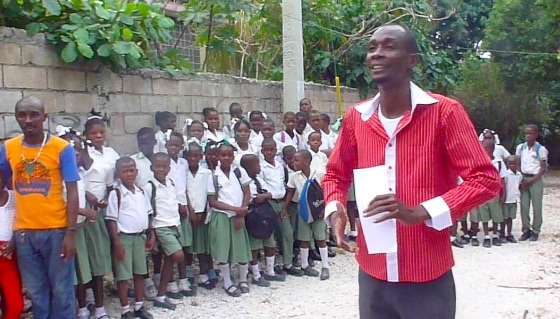
Jean-Ernest Point-du-Jour, President of the Grand Ravine Community Human Rights Council-GR/CHRC that voluntarily managed our program through year 8, speaks to our 100 assembled students from 4 different schools on Jan 26, 2016. Our scholarship pays for tuition, school supplies and uniforms. We get regular academic reports.
|
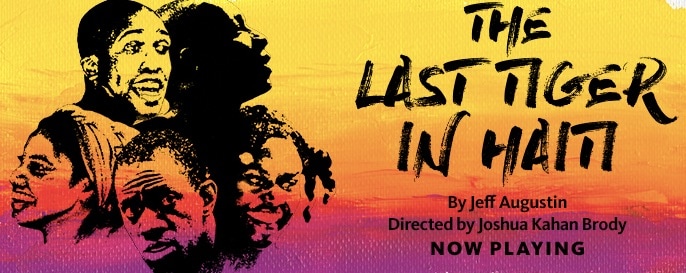
RESTAVEK”? REST = STAY, AVEK = WITH
(Haitian Creole) The United Nations considers “restavek” to be a form of modern-day child slavery. In 2016 the Berkeley Repertory Theatre produced a shocking play--“The Last Tiger In Haiti”-- about child slaves/“restaveks”. The play presented in dramatic form a moving depiction of what our “Bruner Memorial Scholarship” program was set up to prevent from happening to children in the inner-city neighborhood of Grand Ravine in Port-au-Prince. During our Afro-American Celebration series and, in the memory of Martin Luther King, Jr., we are proud to hold up the work of St. Columba’s Haiti Ministry. We honor the human rights work of the Grand Ravine Community Human Rights Council (GR/CHRC) and the role they played in “Hope For Haiti:Education”. Just after the massive earthquake in Jan. 2010, GR/CHRC Pres. Point-du-Jour informed St. Columba that education of their most impoverished children was their greatest need. Access to education holds families together, keeps children from street crime and becoming “restaveks” (staying with, i.e. living with other than their family: check out Wikipedia, and "Restavek Freedom") represents HOPE for the future of Haiti. The GR/CHRC carefully selected students, chose safe, accessible schools, negotiated tuition fees, and since then have purchased school supplies including uniforms for the students, and provided accounting records for the last 7 years. Sadly we had to reduce our project to one school iin year 8 (2018-19). We celebrate Haiti as the only Black Republic established by slaves who rose up to break their chains. On Jan. 1, 1804, Haiti became the first country in the western hemisphere to abolish slavery. As a result, its history has been full of conflict, violence, repression, and interference by other countries including the United States.(See Frederick Douglass' speech in 1893 at Chicago's World Fair) We praise the volunteers -- families, community leaders, educators and church people, including victims of violence -- who make up the GR/CHRC, and who, rather than responding with violence, have forged ahead to promote peaceful advocacy for all human rights and justice, using education and advocacy as their tools. We are inspired and grateful for the bond we share with them. GLOBAL SLAVERY INDEX – 2016 The Global Slavery Index ranks Haiti 8TH in the world for modern slavery -- down from 2nd in 2013 -- with an estimated 106,600 slaves, the vast majority minors. (The U.S. ranks 52 with 57,700 cases, which has 30 times more people.) In exchange for a promised better life and education for children of families who cannot afford to support them, the child “restavek” will contribute to household chores like cooking, washing clothes and fetching water. In thousands of cases, children are forced into servitude: to take on most, if not all, of the household work, beaten and sexually assaulted, and they never get the education they hoped to earn. For more info on erradicating this system, go to <restavekfreedom.org>. This group has been leading a series of conferences to promote eradication of “restaveks”. |
